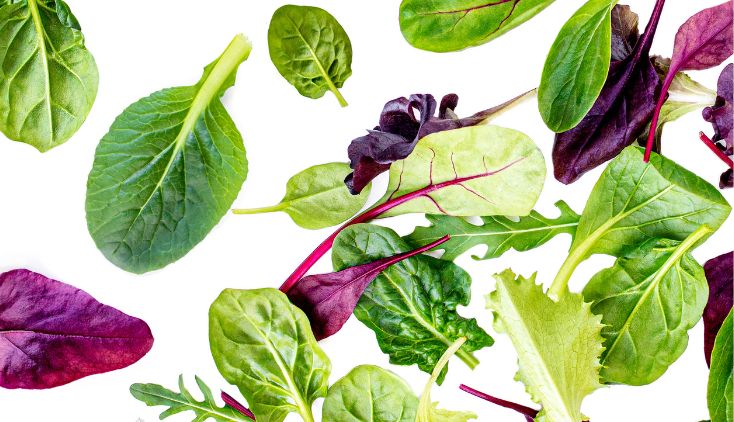Diet Tips for Diabetics
Managing diabetes often comes down to one major factor: keeping blood sugar levels steady. While medications and exercise play an important role, the food you eat every day has perhaps the greatest impact. Choosing the right foods can help prevent dangerous spikes or drops in blood sugar, reduce the risk of complications and improve overall health. Let's look at ten foods to help control blood sugar and add to your diet.
1. Leafy Greens
Spinach, kale, Swiss chard and other dark leafy greens are extremely low in calories and carbohydrates, meaning they have little effect on blood sugar. They are packed with fiber, magnesium and antioxidants that help improve insulin sensitivity and reduce inflammation. The vitamin K in these vegetables also supports healthy blood circulation. Fiber slows digestion, which prevents sudden spikes in glucose after meals. Plus, leafy greens are filling and can replace higher-carb foods on your plate.
2. Whole Grains
Unlike refined grains (like white bread or white rice), whole grains such as brown rice, oats, quinoa and barley contain the entire grain, providing more fiber, vitamins and minerals. The fiber in whole grains slows the absorption of sugar into the bloodstream, leading to more stable blood sugar levels. Whole grains also improve gut health, which plays an important role in overall metabolism.
3. Fatty Fish
Fish like salmon, mackerel, sardines and tuna are rich in omega-3 fatty acids, which fight inflammation and protect the heart. Since diabetes raises the risk of heart disease, including fatty fish in your diet is especially important. Fatty fish doesn’t raise blood sugar, and the healthy fats improve cholesterol levels and lower the risk of cardiovascular complications linked to diabetes.
4. Beans and Lentils
Beans, chickpeas and lentils are excellent sources of plant-based protein and fiber. They are filling, affordable and versatile. These foods have a low glycemic index, meaning they raise blood sugar more slowly than many other carbohydrate-rich foods. Eating beans regularly can improve blood sugar control and even help lower blood pressure.
5. Nuts and Seeds
Almonds, walnuts, chia seeds, flaxseeds and pumpkin seeds are rich in healthy fats, protein and fiber. Nuts and seeds help slow digestion and reduce the rise in blood sugar after meals. They also support heart health by lowering “bad" cholesterol. Be mindful of portion sizes. Nuts are calorie-dense, so a small handful is usually enough.
6. Berries
Blueberries, strawberries, raspberries and blackberries are naturally sweet but lower in sugar than many other fruits. They are packed with antioxidants, vitamins and fiber. The antioxidants in berries protect against inflammation and may improve insulin sensitivity. Their fiber content also slows down sugar absorption, making them a safe fruit choice for diabetics.
7. Greek Yogurt
Unsweetened Greek yogurt is high in protein and probiotics while being lower in carbohydrates than regular yogurt. Protein helps stabilize blood sugar by slowing digestion, and probiotics support gut health, which plays a role in glucose metabolism. Choose plain Greek yogurt and add fresh fruit or a sprinkle of nuts instead of flavored varieties with added sugar.
8. Avocados
Avocados are full of healthy monounsaturated fats, fiber and potassium. They contain very little carbohydrate, so they won’t cause spikes in blood sugar. The healthy fats also promote heart health and help keep you feeling full longer, which may reduce cravings for unhealthy snacks.
9. Eggs
Eggs are a great source of high-quality protein and contain important nutrients like vitamin D and choline. Protein slows the digestion of carbs, helping keep blood sugar stable. Eggs may also help with weight management, which is key for controlling diabetes. Studies suggest eggs can improve insulin sensitivity when eaten in moderation.
10. Cinnamon and Spices
Not all helpful foods are main ingredients; some are flavor boosters. Cinnamon, turmeric and ginger have been linked to better blood sugar control. Cinnamon may improve how cells respond to insulin, while turmeric and ginger fight inflammation. Using spices instead of sugar or salt can also make meals healthier overall.
A Healthy Diet Matters
The right diet is one of the most powerful tools for managing diabetes. Foods rich in fiber, protein and healthy fats are especially important because they help slow digestion and prevent blood sugar spikes. Meanwhile, foods high in added sugar and refined carbs should be limited.
Remember, there is no “one-size-fits-all" diet for diabetes. However, by regularly including foods to help control blood sugar you can take strong steps toward maintaining your health.
Keep reading to learn about some of the worst foods for seniors.
